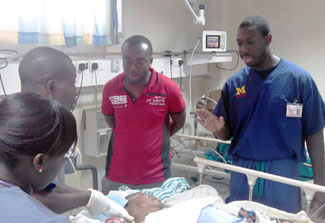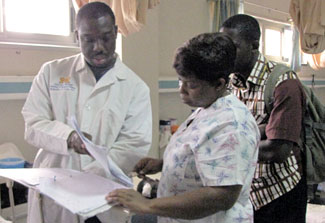Profile: Fogarty Fellow Dr Rockefeller Oteng studies trauma, injury in Ghana
March / April 2015 | Volume 14, Issue 2

Photo courtesy of Dr. Rockefeller Oteng
Dr. Rockefeller Oteng studied how patient outcomes had
changed because of the new emergency care department
at Komfo Anokye Teaching Hospital in Ghana.
By Cathy Kristiansen
Research wasn't part of his original career plan, but Dr. Rockefeller Oteng found he was lacking the skills to adequately measure the outcomes of his work. Part of a team in Ghana to train physicians and establish the country's first emergency medicine department, he discovered it was difficult to determine if they had actually improved patient outcomes over the first two years of the program.
Oteng was on assignment from the University of Michigan to Komfo Anokye Teaching Hospital (KATH), where the paper medical record system was incomplete and patients received multiple identification numbers as they moved through the different hospital departments. Part of capacity building is being able to document there's a problem and that the solution you are proposing will help, he said. "As I grew as a clinician and as a global health worker, I realized I needed more of an understanding of clinical research and its effect and possible uses in my work."
After some thought, Oteng applied to Fogarty's Global Health Program for Fellows and Scholars to venture into this new field. "For me, the Fogarty fellowship was that next step of learning how to do research, how to describe my thinking and how my discoveries could be translated to others."
Fogarty collaborates with many NIH Institutes, Centers and offices to provide one-year, mentored clinical research experiences overseas for postdoctoral Fellows and pre-doctoral Scholars, helping to foster the next generation of clinical investigators and to build global health partnerships between U.S. and other researchers and institutions. The National Institute of General Medical Sciences (NIGMS) supported Oteng's fellowship.
Oteng said without the fellowship, it would have been difficult to carve out time from his clinical and teaching work. But he flourished under the direction of two experienced mentors, Dr. Cheryl Moyer from his home institution and Dr. Charlie Mock from the University of Washington. His learning was well-structured, he recalled. For instance, Moyer assigned chapters from a research methods book and followed up with regular calls. "I would explain my interpretation and we would talk about how to apply those concepts to what I was doing," he said. "It was 'read and apply,' which for me is a super effective way to learn new material and absorb it and make it a part of my daily activities."
For his fellowship research project, Oteng tackled his question of how patient outcomes had changed because of the new emergency care department. He managed to locate and analyze records on 50 trauma patients and produced two recommendations: include more sepsis training in the curriculum, because it was a common diagnosis, and give patients only one identification number for all departments, so they are more easily tracked.

Photo courtesy of Dr. Rockefeller Oteng
With the Fogarty fellowship Dr. Oteng was able to carve out
time from his clinical and teaching work to focus on research.
Frustrated by the paucity of data at the hospital, he obtained a supplemental grant to establish an emergency medicine research office in Ghana. That enabled him to create an electronic database, which now provides a searchable collection of patient information to better document treatment outcomes, spot trends and identify teaching topic priorities. Oteng recently submitted an NIH grant application to expand research training in the country. "The fellowship has paid multiple dividends," he observed.
Preventable deaths from injury, trauma or treatable infections are a heavy health burden throughout sub-Saharan Africa. It is Oteng's hope that the expertise developed in Ghana will be shared throughout the region. Some of the support comes from the Medical Education Partnership Initiative (MEPI), which is co-administered by Fogarty. A dozen African countries make up the MEPI network, which is designed to share expertise. "We're trying to build something that is respectful and sustainable," Oteng said. "It's difficult but it will create leaders who can go on to do incredible things, not only in their country, but for their neighbors."
Oteng was born in Ghana, but moved to the Washington, D.C. area when he was nine years old. Although he initially leaned toward journalism, he decided he could make more of a difference in people's lives as a doctor. "Emergency medicine became my definition of what a doctor is," he said. "You're trained to be ready for anything, so that anytime, anyplace you can have a positive effect on what is happening."
More Information
To view Adobe PDF files,
download current, free accessible plug-ins from Adobe's website.